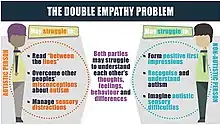Double empathy problem
The double empathy problem is a psychological theory which explicates that social and communication difficulties present in autistic people are due to a reciprocal lack of understanding and bidirectional differences in communication style between autistic people and neurotypicals.[1][2] This theory challenges the widely accepted yet disputed idea that theory of mind and empathy are generally absent in autistic people.

History
Early studies on autism and theory of mind and empathy done in the 1900s concluded that lack of theory of mind was one of the primary symptoms of autism. The most popular of these were studies by Simon Baren-Cohen in the 80s and 90s, who used the term "mindblindess" to describe his theory.[3][4]
In the early 21st century, academics began to suggest that he results of some studies of theory of mind tests on autistic people may be misinterpreted, as autistic people having difficulty understand neurotypicals as being an intrisic social difficulty present in autistic individuals, rather than autistic people specifically having trouble understanding neurotypical people due to the neurological differences between the groups.[1][5]
The term "double empathy problem" was first coined by Damian Milton in 2012.[1]
Neurologically-alligned studies
Studies which have used autistic-autistic pairs to test theory of mind in adults have shown that autistic adults perform better in theory of mind tests when paired with other autistic adults, and that higher rapport may be present in autistic-autistic interactions than in those between autistic and neurotypical people, and that autistic people may be able to understand and predict each other's thoughts and motivations better than neurotypicals[6] as well as possibly autistic close family members.[7]
Neurotypical individuals tend to have a poor theory of mind for autistic people, in the same manner as autistic people have a poor theory of mind for neurotypicals.[1] It is likely autistic people understand non-autistic people to a higher degree than vise-versa, due to the necessity of functioning in a non-autistic society,[1] which begins at a young age in order to avoid bullying, a common experience in autistic children.[8]
Autistic theory of mind is typically based on the use of rules and logic and may be modulated by differences in thinking.[9] If autistic people were inherently poor at social communication, an interaction between a pair of autistic people would logically be more of a struggle than one between an autistic and neurotypical person. This research contests common misinformation and myths about autistic people in the fields of psychology and psychiatry. Since autistic people rarely get to match neurotypes and socialize with other autistic people, they are seen in society as lacking in social ability.
A 2018 study has shown that autistic people are more prone to object personification.[10]
Autistic perspectives
Many autistic activists have shown support for the double empathy problem, and argued that past studies done on theory of mind in autism have served to stigmatise autistic people[2] and lay the blame for autistic-neurotypical misunderstandings solely on autistic people,[11] as well as de-humanising autistic people by prortaying them as unempathetic.
Damian Milton has decribed the belief that autistic people lack theory of mind as a myth analogous with the now discredited theory that vaccines cause autism.[12]
References
- Milton, Damian E.M. (October 2012). "On the ontological status of autism: the 'double empathy problem'". Disability & Society. 27 (6): 883–887. doi:10.1080/09687599.2012.710008. ISSN 0968-7599. S2CID 54047060.
- DeThorne, Laura S. (2020-03-01). "Revealing the Double Empathy Problem". The ASHA Leader. 25 (3): 58–65. doi:10.1044/leader.ftr2.25042020.58. S2CID 216359201. Retrieved 2022-04-16.
- Baron-Cohen, Simon; Leslie, Alan M.; Frith, Uta (1985-10-01). "Does the autistic child have a "theory of mind" ?". Cognition. 21 (1): 37–46. doi:10.1016/0010-0277(85)90022-8. ISSN 0010-0277. PMID 2934210. S2CID 14955234.
- Baron-Cohen, Simon (1988-10-01). "Social and pragmatic deficits in autism: Cognitive or affective?". Journal of Autism and Developmental Disorders. 18 (3): 379–402. doi:10.1007/BF02212194. S2CID 2050249.
- Rogers, Kimberley; Dziobek, Isabel; Hassenstab, Jason; Wolf, Oliver T.; Convit, Antonio (2007-04-01). "Who Cares? Revisiting Empathy in Asperger Syndrome". Journal of Autism and Developmental Disorders. 37 (4): 709–715. doi:10.1007/s10803-006-0197-8. ISSN 1573-3432. PMID 16906462. S2CID 13999363.
- Crompton, Catherine J.; Sharp, Martha; Axbey, Harriet; Fletcher-Watson, Sue; Flynn, Emma G.; Ropar, Danielle (2020-10-23). "Neurotype-Matching, but Not Being Autistic, Influences Self and Observer Ratings of Interpersonal Rapport". Frontiers in Psychology. 11: 586171. doi:10.3389/fpsyg.2020.586171. ISSN 1664-1078. PMC 7645034. PMID 33192918.
- Sucksmith, E.; Allison, C.; Baron-Cohen, S.; Chakrabarti, B.; Hoekstra, R. A. (2013-01-01). "Empathy and emotion recognition in people with autism, first-degree relatives, and controls". Neuropsychologia. 51 (1): 98–105. doi:10.1016/j.neuropsychologia.2012.11.013. ISSN 0028-3932. PMC 6345368. PMID 23174401.
- Dickter, Cheryl L.; Burk, Joshua A.; Zeman, Janice L.; Taylor, Sara C. (2020-06-01). "Implicit and Explicit Attitudes Toward Autistic Adults". Autism in Adulthood. 2 (2): 144–151. doi:10.1089/aut.2019.0023. ISSN 2573-9581. S2CID 212921826.
- Spikins, Penny; Wright, Barry; Hodgson, Derek (2016-10-01). "Are there alternative adaptive strategies to human pro-sociality? The role of collaborative morality in the emergence of personality variation and autistic traits". Time and Mind. 9 (4): 289–313. doi:10.1080/1751696X.2016.1244949. ISSN 1751-696X. S2CID 151820168.
- White, Rebekah; Remington, Anna (2018). "Object personification in autism: This paper will be very sad if you don't read it". Autism. 23 (4): 1042–1045. doi:10.1177/1362361318793408. ISSN 1362-3613. PMID 30101594. S2CID 51969215.
- Heasman, Brett; Gillespie, Alex (2018). "Perspective-taking is two-sided: Misunderstandings between people with Asperger's syndrome and their family members". Autism. 22 (6): 740–750. doi:10.1177/1362361317708287. ISSN 1362-3613. PMC 6055325. PMID 28683569.
- Milton, Damian (2014). "Autistic expertise: A critical reflection on the production of knowledge in autism studies". Autism. 18 (7): 794–802. doi:10.1177/1362361314525281. ISSN 1362-3613. PMID 24637428. S2CID 206715678.